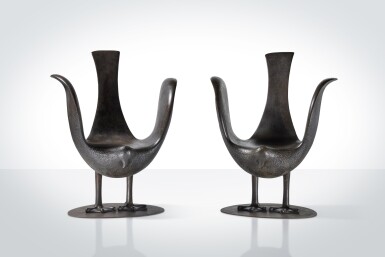
Property from a Private Collection
Judy Kensley McKie
Pair of "Seagull" Chairs
Auction Closed
December 8, 07:38 PM GMT
Estimate
150,000 - 250,000 USD
Lot Details
Description
Property from a Private Collection
Judy Kensley McKie
Pair of "Seagull" Chairs
1999
artist's proof number 1 and number 10 from an edition of 10
patinated bronze
one monogrammed ©JKM and numbered 10/10; one monogrammed ©JKM, dated 99 and incised AP1
40 x 31¼ x 22½ in. (101.6 x 79.3 x 57.1 cm) each
Acquired from the above by the present owner
Judy Kensley McKie is one of the most successful female designers to come out of the American Studio movement due to her uniquely playful design aesthetic. McKie’s first foray into furniture making started out of necessity. She taught herself woodworking to furnish her new home, crafting geometric tables, chairs, and sofas with hand tools. After an introduction to better equipment and experimenting with new methods of construction, McKie had a realization—furniture could benefit from a more personal and imaginative touch. McKie’s imagination led her to create furniture using forms of the natural world, particularly animals.
McKie believed she was transforming furniture from the inanimate to animate through use of animal motifs. She designed beyond utility, prioritizing whimsicality and subject first: “I don’t even think about furniture until I’ve come up with a really interesting looking animal. Then I start to try to fit that animal into a format, and then I try to figure out if I can build it.”
The present lot illustrates McKie’s skill in manipulating material to evoke the essence of an animal. McKie executes armchairs that seem weightless as the seagulls they imitate outstretch their wings, ready for flight. The seagull’s wings are rendered as the overarching arms of the chair, while its tail feather serves as the chair back. McKie produced her furniture in a wide variety of materials, including wood, stone, and metal, as is exhibited in the present lot. Despite the range of materials used, McKie’s work shares a visual language of expressive curvature which evokes the presence of the designer’s hand.
You May Also Like





